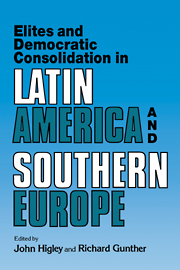Book contents
- Frontmatter
- Contents
- About the contributors
- Preface
- 1 Introduction: elite transformations and democratic regimes
- 2 Spain: the very model of the modern elite settlement
- 3 Elite settlements and democratic consolidation: Colombia, Costa Rica, and Venezuela
- 4 Mexico's elite settlement: conjuncture and consequences
- 5 Elite unification and democratic consolidation in Italy: a historical overview
- 6 The role of civil–military pacts in elite settlements and elite convergence: democratic consolidation in Uruguay
- 7 Patterns of elite negotiation and confrontation in Argentina and Chile
- 8 Elites in an unconsolidated democracy: Peru during the 1980s
- 9 Brazil's political transition
- 10 Redefining the Portuguese transition to democracy
- 11 The Dominican case
- 12 Elites and democratic consolidation in Latin America and Southern Europe: an overview
- Index
4 - Mexico's elite settlement: conjuncture and consequences
Published online by Cambridge University Press: 05 June 2012
- Frontmatter
- Contents
- About the contributors
- Preface
- 1 Introduction: elite transformations and democratic regimes
- 2 Spain: the very model of the modern elite settlement
- 3 Elite settlements and democratic consolidation: Colombia, Costa Rica, and Venezuela
- 4 Mexico's elite settlement: conjuncture and consequences
- 5 Elite unification and democratic consolidation in Italy: a historical overview
- 6 The role of civil–military pacts in elite settlements and elite convergence: democratic consolidation in Uruguay
- 7 Patterns of elite negotiation and confrontation in Argentina and Chile
- 8 Elites in an unconsolidated democracy: Peru during the 1980s
- 9 Brazil's political transition
- 10 Redefining the Portuguese transition to democracy
- 11 The Dominican case
- 12 Elites and democratic consolidation in Latin America and Southern Europe: an overview
- Index
Summary
Elite settlements are rare but decisive events, triggered by recent experiences of costly but inconclusive conflict (or, less dramatically, of prolonged, debilitating factionalism) and, perhaps, by a major crisis. They are accomplished swiftly, even though subsequent consolidation of the settlement may take years; they involve “face-to-face, partially secret, negotiations among the paramount leaders of the major elite factions,” who enjoy “considerable autonomy from mass followings and pressures,” the participation of “experienced political leaders,” and, possibly, formal written agreements and “eminently public documents”; they demand mutual conciliation, which in turn is premised on a perception of shared elite interests and, very likely, “elite fears of levelling sentiments as a prod to quick action”; their most “fundamental and lasting consequence” is a “common elite acceptance of a new code of political conduct” involving continued mutual tolerance and conciliation; and this legacy may, over time, prove conducive to the development of a democratic form of rule, which, in a sense, extends to society at large the principles of mutual tolerance (the “rules of the game”) that the elites have pioneered (Burton and Higley 1987, pp. 11–25). As a result, elite settlements may afford the basis for a consolidated democracy.
This, of course, is the ideal type: The utility of the concept does not require that every item be present in every putative elite settlement. However, it is worth adding that the utility of the concept may vary from person to person, discipline to discipline. Political scientists in a nomothetic quest for broad generalizations look for recurrent patterns, perhaps possessing predictive power.
- Type
- Chapter
- Information
- Publisher: Cambridge University PressPrint publication year: 1991
- 8
- Cited by



